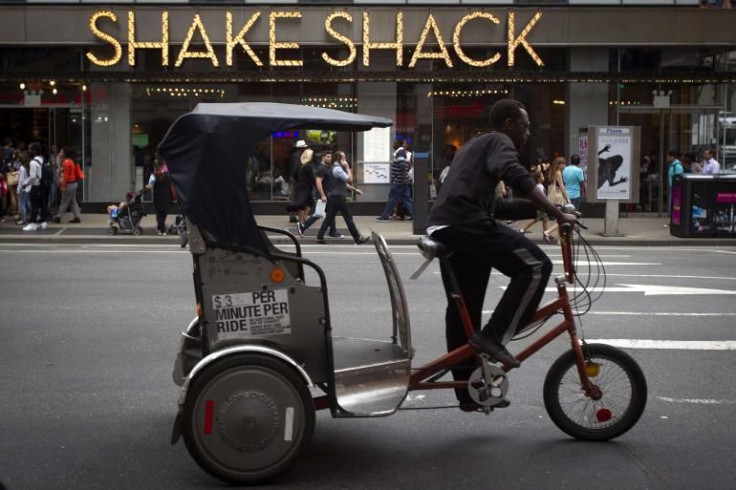Shake Shack Inc (SHAK) Wage Policy Could Confront Pressure From Wall Street

Shake Shack Inc. (NYSE:SHAK) takes pride in its humble beginnings as a hot dog cart in Manhattan’s stately Madison Square Park. A regulatory filing from the 14-year-old burger joint ahead of its Friday debut on the New York Stock Exchange is peppered with feel-good phrases such as “community wealth venture” and “great hospitality folks.” In addition to its reputation for using fresher ingredients than its competitors, the company also boasts higher hourly wages for its workers than big fast-food chains such as McDonald's and Burger King.
“One of the things that may get lost among all the hubbub when a company is ‘going public’ is that the business can now be owned, in part, by its greatest fans,” said a letter signed by the company’s founder and Chairman Danny Meyer and CEO Randy Garutti. But now that Shake Shack is going public, its greatest fans will not include only the loyal customers who line up at its 63 global stores for burgers and frozen custard shakes; it will include shareholders, too.
Wall Street can be unforgiving to companies that don’t yield their expected returns on investment. And it puts immense pressure on them to cut costs and streamline operations in order to maintain a perpetual state of growth and pay dividends when business is doing well.
“Public companies have to face a whole set of pressure from the market and from investors,” Jesse Bragg of Corporate Accountability International, a Boston-based corporate watchdog group, said. “Corporations often end up making tough decisions, like not increasing wages, or, in the food industry, by cutting quality -- anything they can do to boost earnings.”
The question for Shake Shack as it embarks on its public venture is if it can keep investors happy while also sticking to its values, especially regarding its employees' wages and benefits. Similar to California’s In-N-Out Burger and Boston’s Boloco burritos, Shake Shack pays an hourly wage that’s higher than the industry standard for quick-service line cooks and counter staff.
During an interview last year, Boloco co-founder John Pepper told the New York Times that when his 22-store company decided in 2002 to raise its starting hourly wage by 55 percent above the Massachusetts minimum at the time, and offer other benefits unheard of from larger multinational fast-food chains (e.g., subsidizing commuting costs), the company felt an “immediate hit” on its profit. He added, however, that because Boloco is private, it didn’t need to report 20 percent profit margins to shareholders and that it could survive on less.
For its part, Shake Shack seems committed to offering starting hourly wages for its workers that are above the minimum wage floors. At its flagships in Manhattan, employees start at $10 an hour, above the city’s $8 minimum wage. While that’s still meager in a city where a studio apartment an hour away from work can cost over $1,000 a month, it’s higher than what many McDonald’s and KFC workers make in the city.
Shake Shack says in its risk-disclosure statement that paying a little extra attracts “a higher caliber employee and this translates directly to better guest service.” It appears to be committed to this, for now. The most ideal model for Shake Shack’s future as a publicly traded company could be Starbucks Corporation.
The Seattle-based coffee brewing giant has maintained a semblance of its traditional values, including paying tuition for online courses from Arizona State University and offering stock options to its baristas. When Starbucks was criticized last year for the controversial practice of automatic labor scheduling (used widely by retail and fast-food giants, including McDonald’s and Walmart), the company responded by pledging to revise the practice for its 130,000 U.S. workers.
Shake Shack might be able to turn its commitment to better-than-average wages into something Wall Street values. If it doesn’t, however, it might find itself valuing customer costs and shareholders’ interests more than the well-being of its lower-paid employees.
“Actions by publicly listed companies are scrutinized by investors,” Bragg said. “They want the stock to go up, and they want dividends to increase. That quarterly earnings report is the most important document in the life of a publicly traded company.”
© Copyright IBTimes 2024. All rights reserved.




















